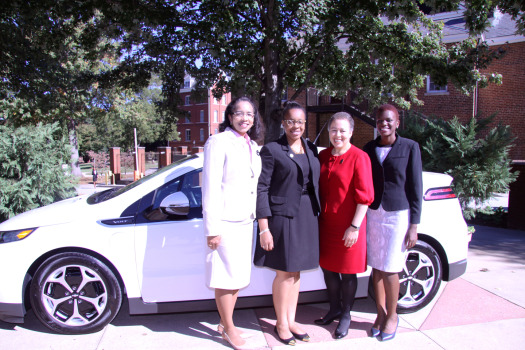
(Photo Credit: Spelman College)
In a climate where media headlines and public opinion often revolve around how HBCUs are constantly enduring enrollment, economic and leadership crises, Spelman College is setting an example for how to avoid succumbing to this statistic.
Part of the reason why the all-female college is successful is because the school makes constant efforts to proactively foster a culture and dialogue between the student body and alumni that promote excellence and sustainability.
President Dr. Beverly Daniel Tatum developed a Climate Action Plan last year. She made a goal to reduce gas emissions by 50 percent in 2031, the same year as Spelman’s 150th anniversary.
So far, Spelman has already reached that 50 percent mark. The campus’ eco-design and conservation manifesto has resulted in the accumulation of an outstanding amount of carbon credits. A renovated residence hall earned the trailblazing institution LEEDS Gold certification in 2012.
The 39-acre, award-winning green campus now uses retrofits to light its facilities and poles. Cardboard recycle bins are also placed across Spelman’s grounds and inside the majority of its buildings.
The campus which is home to the Wellness Revolution advocating for healthy living and lifestyle, acts as a steward for campus- and community-wide sustainability outreach: conducting surveys, facilitating training workshops and managing social media portals. Dr. Tatum takes pride in Spelman’s credibility as one of the nation’s leading academic institutions to embrace environmental consciousness.
Although the poised leader exceeded a groundbreaking fundraising campaign and increased alumni giving, the innovative president set to retire next year after 12 years of leadership, attributes the mobility of Spelman’s sustainability success to students taking initiative towards becoming conservative, eco-friendly citizens.
“This generation of students is very interested in sustainability,” says Dr. Tatum. “They get very excited. At the end of the day, it’s their planet they’re going to have to live on, so they want to be a part of the solution.”
Another reason Spelman is a leader of the higher education pack involves filtering their agendas with the appropriate community partners and organizations.
The same day Spelman celebrates Campus Sustainability Day, Dr. Tatum announces a new partnership with General Motors (GM) via Chevrolet’s Campus Clean Energy Campaign. The college will earn $100,000 from selling its carbon credits to the car brand, which Chevrolet will then retire.
Spelman is one of 12 American institutions approached by GM. The school is the only all-female school, HBCU and school in the state of Georgia selected to participate in the Campus Clean Energy Campaign. Dr. Tatum is reinvesting those funds towards energy efficient resources such as campus-wide LED lighting.
Seated beside Dr. Tatum, interchangeably referring to Spelman’s and Chevrolet’s alliance as both “a natural connection and partnership,” to talk about the collaboration is GM’s Director of Women’s Retail Network (WRN), Celeste Briggs.
The Detroit native and Spelman alumnae (C’81) is elated to return to her alma mater so she can support an environmentally friendly platform. Briggs is proud that WRN, a 13-year-old program she co-founded, works to increase a female presence throughout the automobile industry.
Her presence and loyalty to Spelman, Briggs believes, allows issues such as sustainability to get supported by various communities. “I’m glad to see that my college is leading in this way,” says a proud Briggs.
“Spelman sets a very high standard for other colleges to measure up to. I wouldn’t expect anything less honestly.”
At the announcement, Chevrolet presented a white demo of the 2014 Chevrolet Volt. The arching Bob Boniface-designed hybrid is a compact plug-in electronic vehicle. The Volt’s OnStar-powered capabilities keep a count on the miles it gets from a full charge and on fuel.
Briggs goes on to say that GM’s efforts and energy efficient products like the Volt are a direct result of being customer-focused. It compliments and reflects Spelman’s green-friendly creed and excellence mantra.
“Consumers are not just interested in us as manufacturers,” she says. “[GM] is a global leader in sustainability. It doesn’t matter if our plants are here or in China, we don’t lower our standards anywhere we go.”
Dr. Tatum refers to both Briggs and Sam’s Club CEO (and Spelman alumnae-turned-Board Chair) Rosalind Brewer as “shining examples.” The GM executive works primarily to extend opportunities to women and promote planet-friendly agendas as necessities for corporate responsibility.
It’s extremely important to a result-oriented Briggs that women business owners get support and more visibility in a male-dominated industry. This year, WRN’s “Dream to Succeed” program awarded nine scholarships to women seeking careers in the automobile industry. It also marks the first time Canada was included. Both contributions and the amount of scholarships awarded increased.
It’s equally important to both Briggs and Dr. Tatum that their efforts create a ripple effect for Spelman because it stabilizes the school’s alumni relationships with both students and administration.
“GM puts the customer in the center of everything they do,” says Briggs, who sold medical supplies prior to her tenure at GM. “We have to be conscious, and we have to be responsible for our behavior.”
Briggs, an English major, points out that having both effective communication skills and an innovative approach to the job market laid the foundation for her successful career and her ability to support important causes.
She credits Spelman for instilling in her invaluable life skills that result in her ability to serve in various roles at GM. “It made me uniquely qualified to perform my job,” says Briggs. “Spelman shaped me and made me courageous. You can try things that are nonconventional.”
Spelman and GM, according to Dr. Tatum, understand that sustainability is an essential component to move forward in both education and business. This particular collaboration reinforces how fostering a strong liberal arts education program can structure more cohesive alumni relationships and socially aware communities of business executives.
“We’re proud that one of our graduates is championing the cause of women,” says Dr. Tatum.
“If you can be an effective problem solver, a strong communicator, understand people of all backgrounds and able to engage effectively across lives of difference, you’re going to be successful no matter what you major in.”
This post was written by Christopher A. Daniel, music and pop cultural editor for The Burton Wire. He is also a contributing writer for Urban Lux Magazine and Blues & Soul Magazine. Follow Christopher @Journalistorian on Twitter.
Like The Burton Wire on Facebook. Follow us on Twitter @TheBurtonWire.







